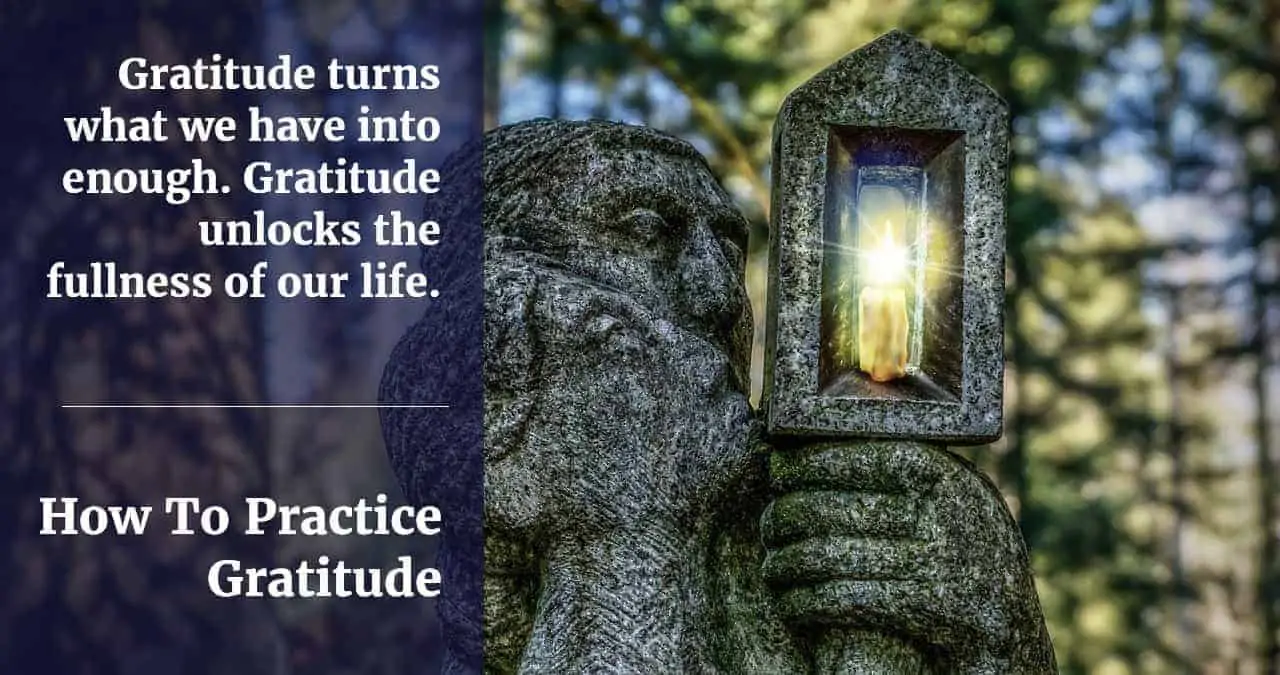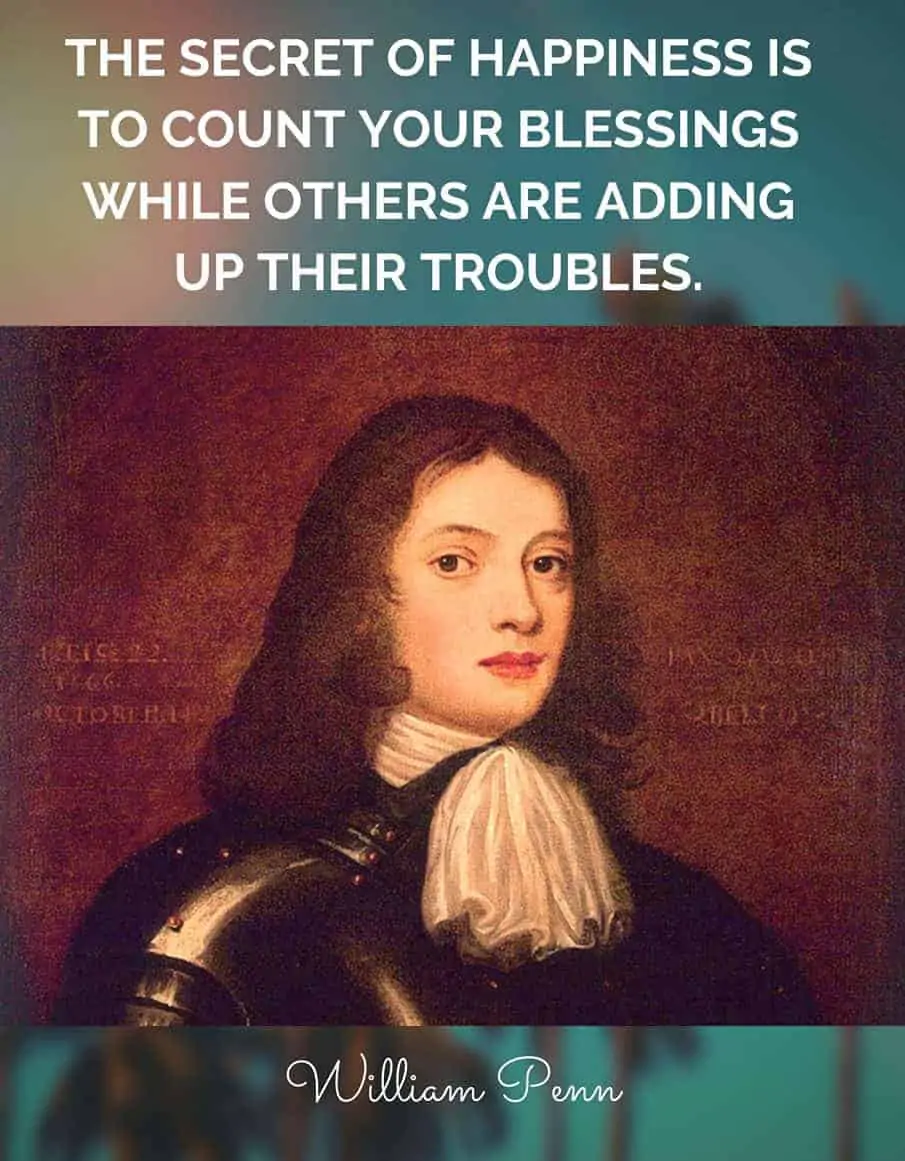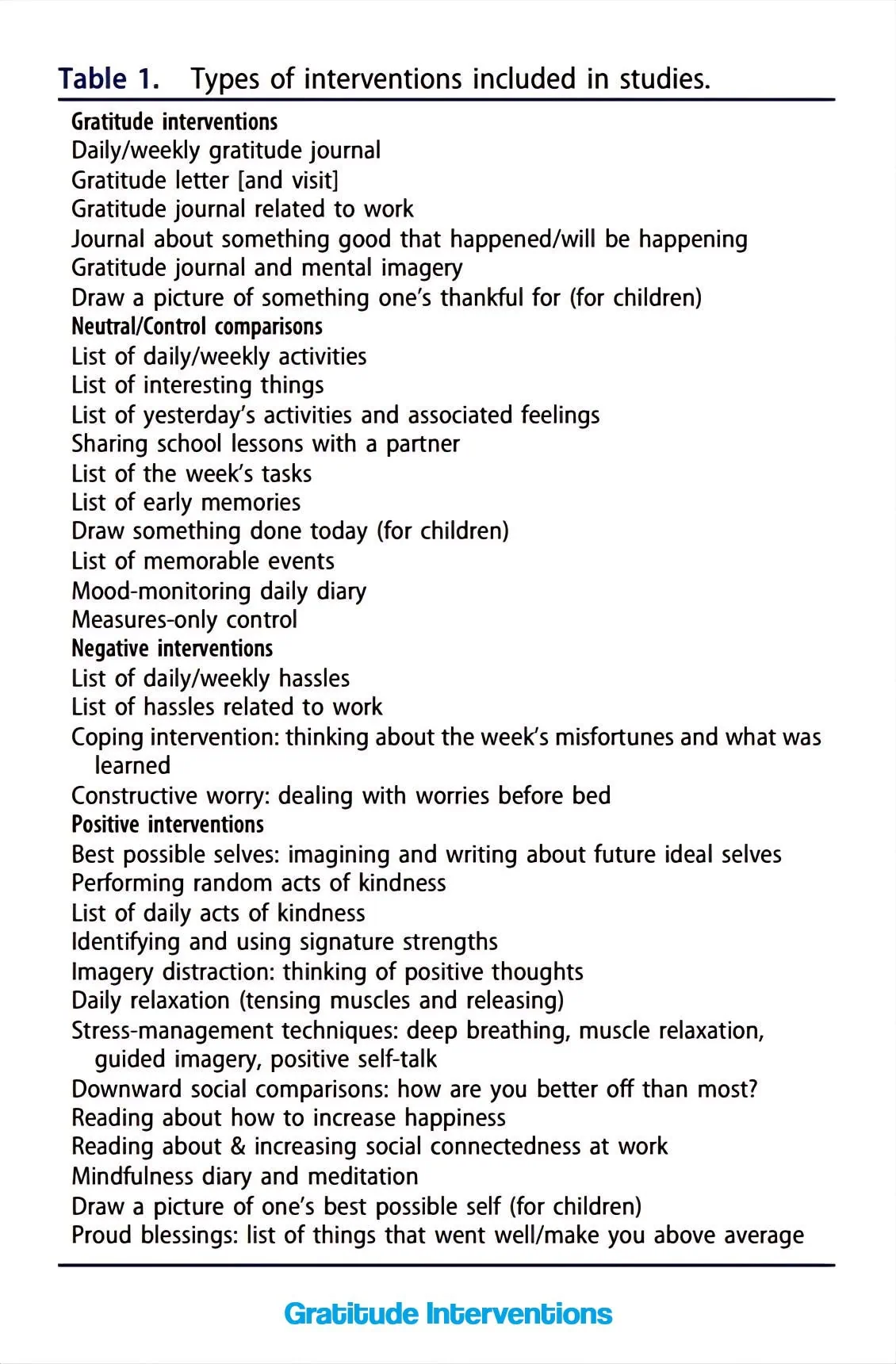Today's Saturday • 13 mins read
You know the importance of gratitude. But the way people have treated you over the years has eroded some part of that nature.
Earlier, you were a grateful person who loved to thank people you met in your day. But these days you do not feel so grateful when you wake up.
So, how can you get back to practicing gratitude in your life again?
First, realize that gratitude is a selfless act.
Saying a meaningful “Thank you” is not the same as the snap reaction, “I owe you one,” which makes you feel indebted. Your feeling grateful does not obligate you.
5 Timely Ways To Practice Gratitude In Life
Gratitude practice or interventions can be of two types:
- those that cultivate feelings of appreciation, and
- those that strengthen your relationships.
Here are 5 science-backed ways to cultivate a grateful mindset:
1. Start A Gratitude Journal
- Try finding a few things you are usually grateful for and write them down in a journal.
- Make it a habit to write a few grateful thoughts about the gifts you received each day.
A gratitude journal can help you develop a grateful mindset. This, in turn, allows you to focus more on the positive aspects of your life and relationships and have more happy feelings.

Find 10 minutes to write things you are grateful for. You could do this in the morning or before going to sleep.
Think about three to five things you are grateful for.
Start with little good things you noticed, such as your house-pot flowers blooming today, or you fixed something in your house, or that the weather was sunny and you sunbathed.
- You could be grateful for the starry night sky.
- You could be grateful for the people you have in your life and for their support.
- Feel gratitude that your toddler just learned to speak a jumble of meaningless words.
Even though it may be difficult to find these things when you start. But the more you practice it, the easier it will be to identify those little things that make you a little happier every day.
Write in your gratitude journal every day, especially on those days when you are down and feel like nothing good happened. You will start appreciating people around you more and take happiness in the brief pleasures of life.
Four simple ideas to make your gratitude journal more beneficial:
- Go deep: write in detail about a particular thing.
- Get personal: focus more on people than on things.
- Take time: don’t rush it; rather, savor the thing you write about.
- Don’t overdo it: Prof. Lyubomirsky and her colleagues found people who wrote in their journals once a week for six weeks reported boosts in happiness later, but those who wrote three times per week didn’t.
Gratitude journaling can boost your well-being, mood, health, and relationships.

2. Write Letters of Gratitude
You may write letters to people to whom you are indebted. You may also write a letter to yourself to say thanks for every good thing you have in your life, paying attention to what you have than what you do not have.
Studies show gratitude expressed towards others can boost happiness, which then leads to positive moods.
When you start your gratitude journal, you will not only find things, but also people you are thankful for. Have you ever expressed your gratitude to them? Well, most of us did not.
So you could start writing letters of gratitude. Your subjects of thanks could be from the present or the past.
Think about those people who inspired and motivated you to pursue your dreams and goals. They could be the people in your life or even public personalities, such as Gandhi, Martin Luther King, Dalai Lama, Alain de Botton, or Stephen Hawking.
The best thing about this is you do not have to deliver those letters if you do not want to. It would be nice to make someone dear to you a pleasant surprise with your gratitude letter, but not all of us feel they could do this.
And that is fine; just tell yourself you would never judge yourself for writing it.
Writing a simple letter of gratitude to someone close to you will make you feel happier and less stressed. It is also a great way to stop taking the people in your life for granted and instead appreciate them more.
3. Pay Attention To What You Have
You may call it counting your blessings, or expressing thankfulness for all the good things you have in your life.
Being grateful may come with challenges for some of us. Instead of focusing on the things that make us happy, we might tend to focus on the ones that make us sad.
Our brains are used to noticing more of the bad things that happen every day in our life. So, it is difficult to teach it to be more grateful and positive. While this is not an impossible task, but a challenging one.
The most important piece of advice would be to pay attention to what you have, and not to what you lack.
For example, instead of focusing on the fact that one of your friends forgot your birthday, you could change your perspective. And instead, you could be grateful for all those times your friend had been beside you.
If you find it difficult, then try to imagine your life without a particular thing around you — for example, your mobile, your home, or your bed.
Practicing gratitude will help you see the challenges in your life not as drawbacks, but as opportunities to become better. And this applies to both your personal and professional life.
Gratitude will help you change your perspective on many events in your life and help you become more optimistic. Gratitude will help you improve your relationships with your close ones and your overall life experience.
Be grateful for the goodness in your life and count your blessings for having it so. Pick a time every week to sit down and write out your blessings.
Here are three beautiful quotes to remember when it’s time to count your blessings:
- When I count my blessings, I count you twice. — Unknown
- Counting one’s blessings is a barometer of mental health. — Gudjon Bergmann
- Let me always count my blessings. To be thankful for my family and friends. To be thankful for the simple things that life has to offer. — Catherine Pulsifer

4. Say Your Prayers
You do not have to be religious to say a prayer. However, research shows people who are religious or spiritual have it easier to maintain an attitude of gratitude.
Even if you are an atheist or secular, you may craft a personal gratitude prayer, or use secular grace like the one below:
As we eat, let us turn our minds to every individual we know, and wish them plenty, love and comfort on this day and every day. As we sit together, let us turn our minds to those we do not know, and wish them plenty, love and comfort on this and every day. As we celebrate, let us turn our minds and hearts to love, always love, of everyone on this world. Finally, let us turn our minds and hearts onto ourselves, make our wishes into action: sharing love and comfort whenever we can, with whomever we can, wherever we may be, and be thankful for the opportunities to give, love and comfort. In this way, we give thanks and are thankful in return.
— A Secular Grace For Thanksgiving by Kris Punke
5. Practice Gratitude Meditation
Gratitude and meditation go hand in hand; one enhances the other.
Meditation helps you accept all your thoughts, and it nurtures your inner self. It nurtures gratitude, self-acceptance, and a less judgmental view of yourself and your environment.
Gratitude meditation is the practice of reflecting on the things in your lives you’re grateful for. It’s experiencing appreciation for a loved one, a beautiful day, or a scoop of ice cream.
It can well be for things in your past — as being grateful for a quick recovery from an illness, or having weathered a tough time of your life and coming out strong.
You can be grateful for waking up in the morning, for the breath that gives you life, and for your ability to interact with this beautiful world.
You could practice meditation in many forms; mindfulness is the most popular of them all. Mindfulness focused on gratitude can help you foster gratitude and nurture your inner self. Meditating mindfully involves focusing on the present moment without judgment.
The idea behind practicing mindfulness is that you learn to take notice of all your thoughts, positive or negative. You learn to notice and let them go without judgment. You learn to approach them with hope, acceptance, and grace.
You can find a great gratitude meditation script by Buddhist monk Jack Kornfield here.
And below is a guided morning meditation for gratitude practice:
The 30-Day Gratitude Challenge
The following 30-day gratitude challenge comes from Deborah Jepsen at Melbourne Child Psychology:
Give the following a try for 30 days and see what effect it has on your life:
- Write down three things each day for which you are thankful. These should be specific, not general. For example, “I am grateful for the way my toddler likes to hug me.” (Rather than, “I am thankful for my kids” … or my job or my house, etc.). The key is to express genuine gratitude and appreciation for specific things you already have in your life, and not to think like a victim who ‘deserves’ more or who wishes they had more of something.
- Write down one thing each day you could do to improve your life. Something small is fine. For example, “I am going to clean the windows so they are crystal clear, and I can enjoy the view better.” (Try to do the things that you write down, so start with low-effort things.)
- Once per week for 10 minutes, write about your ideal life in detail. Write as if it is already happening and real, not just wishful or hopeful. For example, “I am enjoying a walk along a beautiful tropical beach with clear white sand on a balmy evening with palm trees gently swaying in the light breeze,” not “I wish I could…”). Stop after 10 mins, even if unfinished, and pick it up next week or write on another aspect of your ideal life.
Types of Gratitude Activities (From Research)
The table below shows a list of gratitude activities that researchers have used in their studies. Find an activity that you feel is genuine, enjoyable, and suits you best (called person-activity fit). With trial and error, you can build a gratitude routine that is uniquely helpful to you.
Here’s what to do in each gratitude intervention in the table above:
Gratitude Interventions
- Daily/weekly gratitude journal: Write down things you are thankful for every day or every week.
- Gratitude letter [and visit]: Write a letter to someone thanking them for something they did and, if possible, visit them to read it out.
- Gratitude journal related to work: Focus on things you are grateful for at your job and write them down.
- Journal about something good that happened/will be happening: Note down positive events that have happened or ones you look forward to.
- Gratitude journal and mental imagery: Write about what you are thankful for and imagine those moments vividly in your mind.
- Draw a picture of something one’s thankful for (for children): Kids can draw pictures of things or people they appreciate.
Neutral/Control Comparisons
- List of daily/weekly activities: Write down what you do every day or week.
- List of interesting things: Make a list of things that you find fascinating.
- List of yesterday’s activities and associated feelings: Note what you did yesterday and how you felt about it.
- Sharing school lessons with a partner: Talk about what you learned in school with a friend.
- List of the week’s tasks: Write down tasks you need to do for the week.
- List of early memories: Recall and list your early childhood memories.
- Draw something done today (for children): Kids can draw something they did during the day.
- List of memorable events: Make a list of events that you’ll always remember.
- Mood-monitoring daily diary: Keep track of your mood every day.
- Measures-only control: Just record data without any specific activity.
Negative Interventions
- List of daily/weekly hassles: Write down the small troubles you face daily or weekly.
- List of hassles related to work: Note down issues or difficulties you encounter at work.
- Coping intervention: Think about the week’s misfortunes and what was learned: Reflect on the problems you faced during the week and what you learned from them.
- Constructive worry: dealing with worries before bed: Spend some time thinking about your worries and finding solutions before going to sleep.
Positive Interventions
- Best possible selves: imagining and writing about future ideal selves: Think about your best future self and write about it.
- Performing random acts of kindness: Do kind things for others without expecting anything in return.
- List of daily acts of kindness: Keep a record of the kind things you do each day.
- Identifying and using signature strengths: Discover your personal strengths and use them.
- Imagery distraction: thinking of positive thoughts: Distract yourself with happy thoughts when you’re feeling down.
- Daily relaxation (tensing muscles and releasing): Practice relaxing by tensing and then relaxing your muscles.
- Stress-management techniques: deep breathing, muscle relaxation, guided imagery, positive self-talk: Use methods like deep breathing, relaxing muscles, imagining calm places, and talking positively to yourself to manage stress.
- Downward social comparisons: how are you better off than most?: Think about how you are better off compared to others.
- Reading about how to increase happiness: Learn by reading about ways to become happier.
- Reading about & increasing social connectedness at work: Read about and try to improve your connections with colleagues.
- Mindfulness diary and meditation: Keep a diary of your mindfulness practice and meditate regularly.
- Draw a picture of one’s best possible self (for children): Kids can draw a picture of themselves as they want to be in the future.
- Proud blessings: list of things that went well/make you above average: Write about things that make you proud and what went well in your life.
Final Words
Gratitude encourages us not only to appreciate our gifts, but also to repay them, or pay them forward.
Gratitude may motivate people to engage in positive behaviors that benefit their lives, the lives of the people around them, and the community at large.
One thing is certain: by developing an attitude of feeling more grateful at each chance we get, we gift ourselves authentic happiness.
• • •
Author Bios: Leon Collier wrote an early version of this. Edited and rewritten by Sandip Roy.
√ If you liked it, please spread the word.

